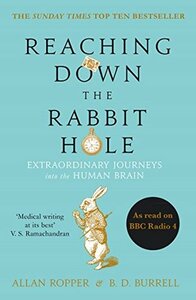Take a photo of a barcode or cover
31 reviews for:
Reaching Down the Rabbit Hole: A Renowned Neurologist Explains the Mystery and Drama of Brain Disease
Allan H. Ropper
31 reviews for:
Reaching Down the Rabbit Hole: A Renowned Neurologist Explains the Mystery and Drama of Brain Disease
Allan H. Ropper
emotional
hopeful
informative
inspiring
reflective
medium-paced
informative
slow-paced
emotional
informative
tense
medium-paced
medium-paced
"The act of listening is therapeutic in itself" is a major theme throughout the book. When a confused person has no insight into their own predicament being able to suss out the cause requires an attentive ear, a skill the author laments the next generation of neurologists are not practicing. At times the book reads like an episode of House M.D. and at other times like a less polished Oliver Sacks. This book is much more about what it means to be a clinician than really exploring the science of the brain.
This book was interesting enough for me to finish it in three days, but it's not a book I would tell anyone to go buy right now. Pick it up if you find it at a book exchange or in a bargain bin, though. It is well-written and generally entertaining, but it spends more time on the drama of brain disease than on the mystery of it. A sick person comes into the hospital, no one can figure out what's wrong with him or her until our hero neurologist walks into the room and proves he's smarter than everyone else, and then their long and painful process of recovery (or not) is extensively described, including how it made the doctor feel. It is not like the books by Oliver Sacks, because it describes common brain diseases more than rare ones, which makes it less exciting than it could have been, no matter how touching the stories about Parkinson's and ALS sufferers are. There is also a lot of reflection on what it means to be a doctor in general and a neurologist in particular, which is at times interesting but often strays towards the overly self-congratulatory. Allan Ropper is clearly very impressed by his own genius. I also thought it was funny that at one point in the book he makes fun of other doctors for boasting about their celebrity patients and then continues to mention on every other page that he treated Michael J. Fox for Parkinson's.
Like Do No Harm, it’s always interesting to hear medical anecdotes from top surgeons, or in this case, neurologists.
At parts it read like a field guide for hypochondriacs as there is a whole chapter on fakers and what the tell tale lies were.
Motor neuron sector was particularly sad.
At parts it read like a field guide for hypochondriacs as there is a whole chapter on fakers and what the tell tale lies were.
Motor neuron sector was particularly sad.
Pretty good. At first I was a little put off by how much dialogue there was instead of getting into the nitty gritty details of the mental disorders themselves. Also, it begins with a rapid-fire introduction of six different people and you don't really get to hear much about what the actual ailment is, but later on the book settles down and goes into each case in much more depth.
It still lacked some of the medical details I have enjoyed from other similar books, but the dialogue ended up being a fascinating read as well.
It still lacked some of the medical details I have enjoyed from other similar books, but the dialogue ended up being a fascinating read as well.
A splendid book by an old fashioned and expert diagnostician. A real life Dr Gregory House but without all the unpleasant personality traits.
The early chapters in which he makes some of his perceptive diagnoses were my favourite. The later material in which he debates the ethics of some of the things he and the rest of modern medicine do were also fascinating but I did miss the earlier diagnostic challenges.
A great book to hand to anyone considering a career in medicine that will inspire them to help their fellow humans.
Recommended.
The early chapters in which he makes some of his perceptive diagnoses were my favourite. The later material in which he debates the ethics of some of the things he and the rest of modern medicine do were also fascinating but I did miss the earlier diagnostic challenges.
A great book to hand to anyone considering a career in medicine that will inspire them to help their fellow humans.
Recommended.


